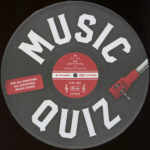There are a lot of angles to the unfolding story of Billboard’s Hot Country Songs chart and Lil Nas X.
The situation is summarized at NYU Local, the online paper: The 20-year-old hip hop artist’s “Old Town Road” gathered momentum (with the help of Justin Bieber) and headed up the Billboard the Hot Country Music chart. Billboard then decided that the song did not qualify as country. The part of the site’s statement excerpted at Vulture:
Determining which chart a song lives on is an ongoing process that depends on a number of factors, most notably the song’s musical composition, but also how the song is marketed and promoted, the musical history of the artist, airplay the song receives and how the song is platformed on streaming services. Billboard welcomes the excitement created by genre-blending tracks such as Lil Nas X’s “Old Town Road” and will continue to monitor how it is marketed and how fans respond. Our initial decision to remove “Old Town Road” from the Hot Country Songs chart could be revisited as these factors evolve.
Billy Ray Cyrus then stepped in. He said what is obvious to anyone who listens: It’s a country song. Cyrus showed his support by doing a remix with Lil Nas X. The original now is number 1 on the Top 100. There are all sorts of special things about the song, according to Stereogum.
It’s an interesting situation. On one level, it suggests that genres of music are drawing closer together. This commentary by Chas Gilman in the NYU piece is worth reading:
Because many contemporary country songs use programmed drum loops, the song sounds fundamentally grounded in hip-hop, except there are twangy guitars and a janky cowboy-bro crooning about beer and four-wheel trucks. By abandoning live drum kits for synthetic drum loops produced on FruityLoops, the whole foundation of the song has been shifted. By adding artificial percussion, autotune, synthesizers, and other musical tools normally foreign to country music, the end result is that country music drifts towards sounding similar to “Old Town Road.”
The other and less comfortable topic is race. Lil Nas X is African-American. Country music, needless to say, is almost exclusively white. Billboard’s statement says in essence that determining if a song fits in a particular genre is subjective. If that’s true, special care must be taken in situations in which there is an obvious racial element.

It gets a bit worse. The Billboard statement notes that “the musical history of the artist” is one criteria used to determine if a song belongs in a particular chart. Does this mean that if Duke Ellington wrote “Eight Days a Week” it would have had less of a chance of getting onto Billboard rock and roll chart? Or that if Willie Nelson wrote “Fight the Power” it would be less worthy of consideration in hip hop chart? Obviously, those are extreme examples. The point is, however, that Lil Nas X’s history shouldn’t have any impact on the fate of a particular song he writes.
It makes more sense, of course, if Billboard’s decision makers meant – perhaps unconsciously – something a bit more in this case than Lil Nas X’s discography. Can anyone think of what that might be?
Racism often is not intended, and it is something of which all people and institutions are guilty. The best we can do is try to become more self-aware over time. Billboard likely was not purposefully being racist in removing Lil Nas X’s song. Hopefully, it will lead them to do better the next time.
Folks interested in this issue should look back on the career of Charlie Pride. Pride is an African-American and country music superstar. The Wikipedia profile also notes that Darius Rucker and DeFord Bailey also are African-American country music stars.


















Recent Comments